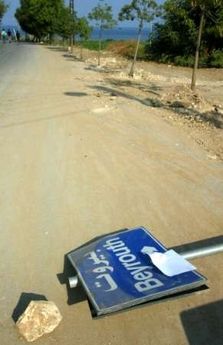Day 4, 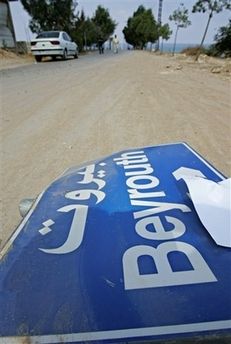 By Alistair Lyon, BEIRUT (Reuters) – Israeli air strikes killed at least 27 civilians on Saturday, pounding Lebanon for a fourth straight day to punish it for letting Syrian- and Iranian-backed Hizbollah fighters threaten northern Israel. President Bush said Syria should persuade Hizbollah to stop cross-border attacks from Lebanon’s mainly Shi’ite Muslim south.
By Alistair Lyon, BEIRUT (Reuters) – Israeli air strikes killed at least 27 civilians on Saturday, pounding Lebanon for a fourth straight day to punish it for letting Syrian- and Iranian-backed Hizbollah fighters threaten northern Israel. President Bush said Syria should persuade Hizbollah to stop cross-border attacks from Lebanon’s mainly Shi’ite Muslim south.
An Israeli missile wrecked a van near the southern port of Tire, killing 15 passengers and wounding six, police said. The van was carrying families fleeing the village of Marwaheen after Israeli loudspeaker warnings to leave their homes. Israeli aircraft also bombed a Hizbollah office in southern Beirut’s Haret Hreik district, and attacked roads, bridges and petrol stations in north, east and south Lebanon, killing at least 12 people and wounding 32, security sources said.
Israel’s campaign, launched after Hizbollah captured two Israeli soldiers and killed eight on Wednesday, has killed 93 people, all but two civilians, and paralyzed Lebanon’s economy. It aims not just to force Hizbollah to free the soldiers, but to destroy its ability to launch rocket attacks on northern Israel, where four civilians have been killed this week. Israel’s aerial assault on Lebanon has drawn mounting world criticism but the White House has said President Bush would not press Israel to halt its military operation. To view more pictures pls click READ MORE, or to view pictures of 1st day and 2nd day pls click NEWS ARCHIVE
To view the end of the article pls scroll down.
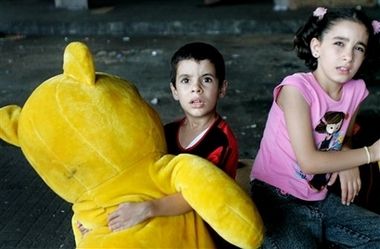 Abdul-Kadir Abdullah, 4, hugs his stuffed bear next to sister Lilaf, 8, right, as they wait for transport to flee to Syria at a bus station near the port in Beirut, Lebanon Saturday, July 15, 2006. The two children were from a Syrian family who had been working in low-wage jobs in Beirut for around 8 years, but vowed they would not return if they managed to get out. (AP Photo/Ben Curtis)
Abdul-Kadir Abdullah, 4, hugs his stuffed bear next to sister Lilaf, 8, right, as they wait for transport to flee to Syria at a bus station near the port in Beirut, Lebanon Saturday, July 15, 2006. The two children were from a Syrian family who had been working in low-wage jobs in Beirut for around 8 years, but vowed they would not return if they managed to get out. (AP Photo/Ben Curtis)
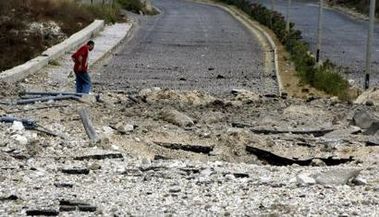 Lebanese civilians inspect a bridge in Nabatiyeh that was hit by Israeli air strikes in south Lebanon July 15,2006. Israeli aircraft pounded areas in south, east and northern Lebanon on Saturday, a day after Hizbollah’s chief declared an open war against the Jewish state following the bombardment of his stronghold in Beirut. REUTERS/Kamil Jaber
Lebanese civilians inspect a bridge in Nabatiyeh that was hit by Israeli air strikes in south Lebanon July 15,2006. Israeli aircraft pounded areas in south, east and northern Lebanon on Saturday, a day after Hizbollah’s chief declared an open war against the Jewish state following the bombardment of his stronghold in Beirut. REUTERS/Kamil Jaber
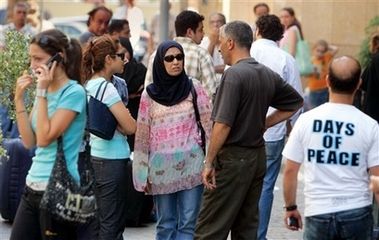 Mostly Saudi-Arabian foreign citizens wait to board a bus evacuating people to Damascus, Syria , outside a hotel in Beirut, Lebanon Saturday, July 15, 2006 as Israeli warplanes pounded Hezbollah’s south Beirut stronghold and roads around the country, killing at least 16 Lebanese as they fled the onslaught. (AP Photo/Ben Curtis)
Mostly Saudi-Arabian foreign citizens wait to board a bus evacuating people to Damascus, Syria , outside a hotel in Beirut, Lebanon Saturday, July 15, 2006 as Israeli warplanes pounded Hezbollah’s south Beirut stronghold and roads around the country, killing at least 16 Lebanese as they fled the onslaught. (AP Photo/Ben Curtis)
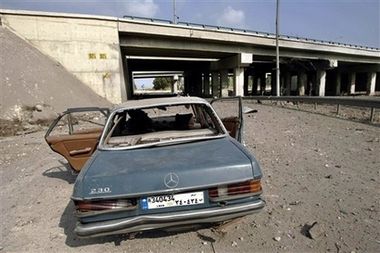 A damaged car is seen abandoned near a destroyed bridge after it was struck by an Israeli warplane missile Friday, near the village of Adousiyeh, southern Lebanon, Saturday July 15, 2006. According to locals, one woman was killed and three other passengers were wounded. Israeli warplanes renewed attacks on Lebanon early Saturday, targeting bridges and fuel storage tanks and gas stations in the east and south, security officials said. (AP Photo/Lefteris Pitarakis)
A damaged car is seen abandoned near a destroyed bridge after it was struck by an Israeli warplane missile Friday, near the village of Adousiyeh, southern Lebanon, Saturday July 15, 2006. According to locals, one woman was killed and three other passengers were wounded. Israeli warplanes renewed attacks on Lebanon early Saturday, targeting bridges and fuel storage tanks and gas stations in the east and south, security officials said. (AP Photo/Lefteris Pitarakis)
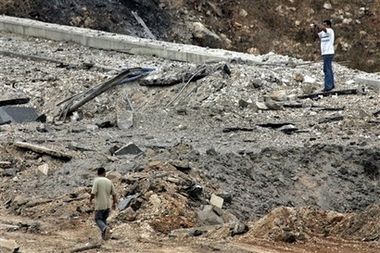 Men inspect the damage over the rubble of a destroyed highway bridge, hit by an Israeli warplane missile earlier, in the town of Nabatiyeh, southern Lebanon, Saturday July 15, 2006. Israeli warplanes renewed attacks on Lebanon early Saturday, targeting bridges and fuel storage tanks and gas stations in the east and south, security officials said. (AP Photo/Lefteris Pitarakis)
Men inspect the damage over the rubble of a destroyed highway bridge, hit by an Israeli warplane missile earlier, in the town of Nabatiyeh, southern Lebanon, Saturday July 15, 2006. Israeli warplanes renewed attacks on Lebanon early Saturday, targeting bridges and fuel storage tanks and gas stations in the east and south, security officials said. (AP Photo/Lefteris Pitarakis)
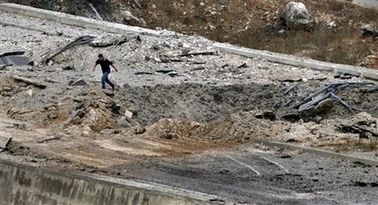 A man walks over the rubble of a destroyed highway bridge, hit by an Israeli warplane missile earlier, in the town of Nabatiyeh, southern Lebanon, Saturday July 15, 2006. Israeli warplanes renewed attacks on Lebanon early Saturday, targeting bridges and fuel storage tanks and gas stations in the east and south, security officials said. (AP Photo/Lefteris Pitarakis)
A man walks over the rubble of a destroyed highway bridge, hit by an Israeli warplane missile earlier, in the town of Nabatiyeh, southern Lebanon, Saturday July 15, 2006. Israeli warplanes renewed attacks on Lebanon early Saturday, targeting bridges and fuel storage tanks and gas stations in the east and south, security officials said. (AP Photo/Lefteris Pitarakis)
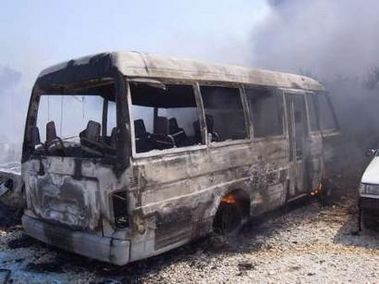 Smoke and fire rise from a burned bus that was hit by Israeli air strikes in Tyre, south Lebanon July 15,2006. Israeli aircraft pounded areas in south, east and northern Lebanon on Saturday, a day after Hizbollah’s chief declared an open war against the Jewish state following the bombardment of his stronghold in Beirut. REUTERS/Haidar Hawila. (LEBANON)
Smoke and fire rise from a burned bus that was hit by Israeli air strikes in Tyre, south Lebanon July 15,2006. Israeli aircraft pounded areas in south, east and northern Lebanon on Saturday, a day after Hizbollah’s chief declared an open war against the Jewish state following the bombardment of his stronghold in Beirut. REUTERS/Haidar Hawila. (LEBANON)
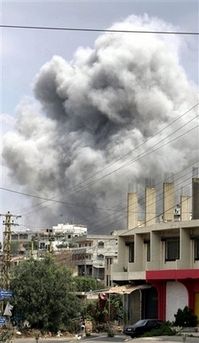 Smoke billows after an Israeli warplane missile struck a target in the village of Nabatiyeh, southern Lebanon, Saturday July 15, 2006. Israeli warplanes renewed attacks on Lebanon early Saturday, targeting bridges and fuel storage tanks and gas stations in the east and south, security officials said. (AP Photo/Lefteris Pitarakis)
Smoke billows after an Israeli warplane missile struck a target in the village of Nabatiyeh, southern Lebanon, Saturday July 15, 2006. Israeli warplanes renewed attacks on Lebanon early Saturday, targeting bridges and fuel storage tanks and gas stations in the east and south, security officials said. (AP Photo/Lefteris Pitarakis)
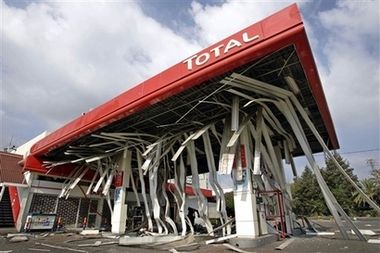 A gas station is seen destroyed after it was struck by an Israeli warplane missile near the village of Adousiyeh, southern Lebanon, Saturday July 15, 2006. Israeli warplanes renewed attacks on Lebanon early Saturday, targeting bridges and fuel storage tanks and gas stations in the east and south, security officials said. (AP Photo/Lefteris Pitarakis)
A gas station is seen destroyed after it was struck by an Israeli warplane missile near the village of Adousiyeh, southern Lebanon, Saturday July 15, 2006. Israeli warplanes renewed attacks on Lebanon early Saturday, targeting bridges and fuel storage tanks and gas stations in the east and south, security officials said. (AP Photo/Lefteris Pitarakis)
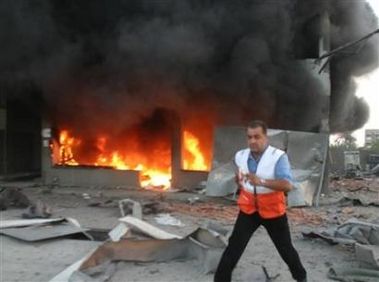 A Lebanese man escapes from a gasoline station after it was hit by an Israeli air strike in Saida, south Lebanon, July 15, 2006. Israeli aircraft pounded areas in south, east and northern Lebanon on Saturday, a day after Hizbollah’s chief declared an open war against the Jewish state following the bombardment of his stronghold in Beirut. BEST QUALITY AVAILABLE (Ali Hashisho/Reuters)
A Lebanese man escapes from a gasoline station after it was hit by an Israeli air strike in Saida, south Lebanon, July 15, 2006. Israeli aircraft pounded areas in south, east and northern Lebanon on Saturday, a day after Hizbollah’s chief declared an open war against the Jewish state following the bombardment of his stronghold in Beirut. BEST QUALITY AVAILABLE (Ali Hashisho/Reuters)
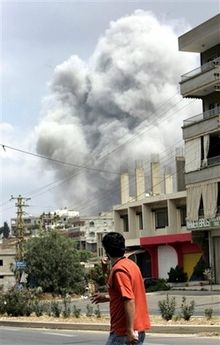 A youth walks to take a look as smoke billows after an Israeli warplane missile struck a target in the southern village of Nabatiyeh, south Lebanon, Saturday July 15, 2006. Israeli warplanes renewed attacks on Lebanon early Saturday, targeting bridges and fuel storage tanks and gas stations in the east and south, security officials said. (AP Photo/Lefteris Pitarakis)
A youth walks to take a look as smoke billows after an Israeli warplane missile struck a target in the southern village of Nabatiyeh, south Lebanon, Saturday July 15, 2006. Israeli warplanes renewed attacks on Lebanon early Saturday, targeting bridges and fuel storage tanks and gas stations in the east and south, security officials said. (AP Photo/Lefteris Pitarakis)
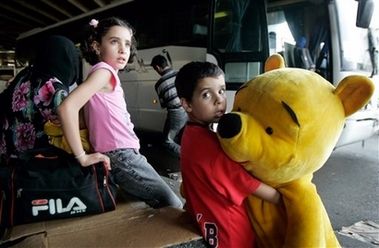 Abdul-Kadir Abdullah, 4, hugs his stuffed bear next to sister Lilaf, 8, center, and mother Bahiyah, 30, as they wait for transport to flee to Syria at a bus station near the port in Beirut, Lebanon Saturday, July 15, 2006. The Syrian family had been working in low-wage jobs in Beirut for around 8 years vowed they would not return if they managed to get out. (AP Photo/Ben Curtis) An elderly man lies under a tree in Horsh Beirut, a wooden area on the road leading to the airport, south of Beirut,
Abdul-Kadir Abdullah, 4, hugs his stuffed bear next to sister Lilaf, 8, center, and mother Bahiyah, 30, as they wait for transport to flee to Syria at a bus station near the port in Beirut, Lebanon Saturday, July 15, 2006. The Syrian family had been working in low-wage jobs in Beirut for around 8 years vowed they would not return if they managed to get out. (AP Photo/Ben Curtis) An elderly man lies under a tree in Horsh Beirut, a wooden area on the road leading to the airport, south of Beirut,
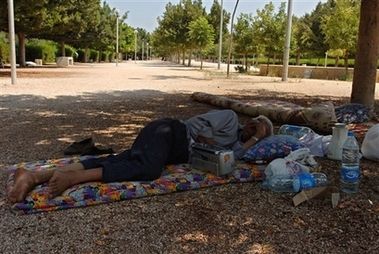 Lebanon, Saturday, July 15, 2006, after he was displaced from his house in the suburbs of Beirut following Israeli raids. Thousands of families have fled southern and eastern Lebanon to escape Israeli airstrikes, with many seeking refuge in government-run school buildings in the capital Beirut. (AP Photo/ Mahmoud Tawil) AP – 55 minutes ago
Lebanon, Saturday, July 15, 2006, after he was displaced from his house in the suburbs of Beirut following Israeli raids. Thousands of families have fled southern and eastern Lebanon to escape Israeli airstrikes, with many seeking refuge in government-run school buildings in the capital Beirut. (AP Photo/ Mahmoud Tawil) AP – 55 minutes ago
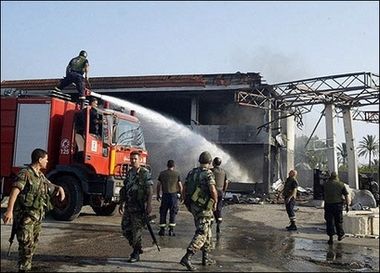 Lebanese soldiers and firefighters put out the flames at a petrol station after an Israeli raid on Saida. Ten civilians were killed in an Israeli helicopter gunship attack on residents fleeing border villages in southern Lebanon.(AFP/Mahmoud Zayat)
Lebanese soldiers and firefighters put out the flames at a petrol station after an Israeli raid on Saida. Ten civilians were killed in an Israeli helicopter gunship attack on residents fleeing border villages in southern Lebanon.(AFP/Mahmoud Zayat)
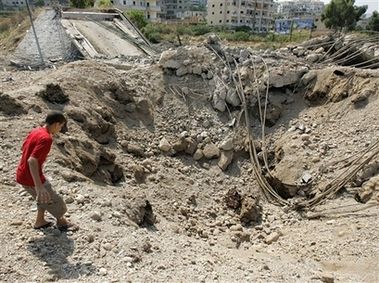 A Lebanese youth stands next to a crater caused by Israeli air raids on a bridge in the coastal town of Naameh, south of Beirut, Lebanon, Saturday, July 15, 2006. Israeli warplanes renewed attacks on Lebanon early Saturday, targeting bridges, fuel storage tanks and gas stations in the east and south, security officials said. (AP Photo/Hussein Malla)
A Lebanese youth stands next to a crater caused by Israeli air raids on a bridge in the coastal town of Naameh, south of Beirut, Lebanon, Saturday, July 15, 2006. Israeli warplanes renewed attacks on Lebanon early Saturday, targeting bridges, fuel storage tanks and gas stations in the east and south, security officials said. (AP Photo/Hussein Malla)
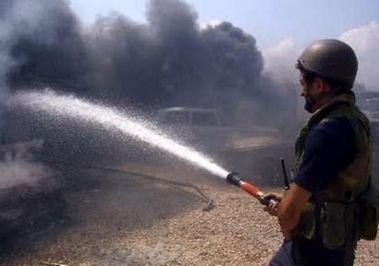 A Lebanese firefighter tries to extinguish a flaming gas station set ablaze during an Israeli warplanes attack in the southern port city of Sidon, Lebanon, Saturday, July 15, 2006. Israeli warplanes renewed attacks on Lebanon early Saturday, targeting bridges, fuel storage tanks and gas stations in the east and south, security officials said. (AP Photo/Mohammed Zaatari)
A Lebanese firefighter tries to extinguish a flaming gas station set ablaze during an Israeli warplanes attack in the southern port city of Sidon, Lebanon, Saturday, July 15, 2006. Israeli warplanes renewed attacks on Lebanon early Saturday, targeting bridges, fuel storage tanks and gas stations in the east and south, security officials said. (AP Photo/Mohammed Zaatari)
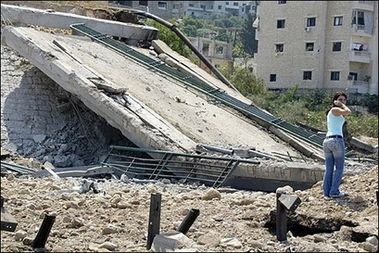 A Lebanese woman calls her relatives as she stands next to destroyed Damur bridge. Israel has kept up its blistering offensive against Lebanon after Hezbollah guerrilla leader Hassan Nasrallah defiantly declared open war in a conflict that appears to be spiralling dangerously out of control despite international calls for restraint.(AFP/Ramzi Haidar)
A Lebanese woman calls her relatives as she stands next to destroyed Damur bridge. Israel has kept up its blistering offensive against Lebanon after Hezbollah guerrilla leader Hassan Nasrallah defiantly declared open war in a conflict that appears to be spiralling dangerously out of control despite international calls for restraint.(AFP/Ramzi Haidar)
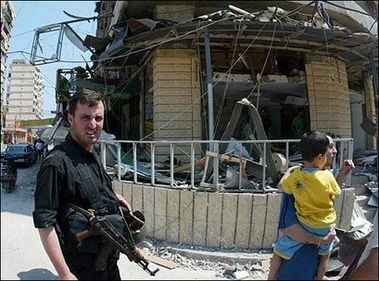 A Hezbollah militant surveys the damage to shops in the Beirut suburb of Dahyieh Junubiya. Israel has kept up its blistering offensive against Lebanon after Hezbollah guerrilla leader Hassan Nasrallah defiantly declared open war in a conflict that appears to be spiralling dangerously out of control despite international calls for restraint.(AFP/Anwar Amro)
A Hezbollah militant surveys the damage to shops in the Beirut suburb of Dahyieh Junubiya. Israel has kept up its blistering offensive against Lebanon after Hezbollah guerrilla leader Hassan Nasrallah defiantly declared open war in a conflict that appears to be spiralling dangerously out of control despite international calls for restraint.(AFP/Anwar Amro)
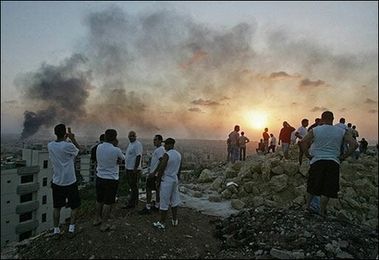 Lebanese civilians watch an Israeli aircraft (not in picture) bombing Beirut. Israel has kept up its blistering offensive against Lebanon after Hezbollah guerrilla leader Hassan Nasrallah defiantly declared open war in a conflict that appears to be spiralling dangerously out of control despite international calls for restraint.(AFP/Joseph Barrak)
Lebanese civilians watch an Israeli aircraft (not in picture) bombing Beirut. Israel has kept up its blistering offensive against Lebanon after Hezbollah guerrilla leader Hassan Nasrallah defiantly declared open war in a conflict that appears to be spiralling dangerously out of control despite international calls for restraint.(AFP/Joseph Barrak)
 Lebanese citizens walk on a road connecting Beirut to the South, where a sign reading ‘Beirut’ lies damaged on the ground, in the coastal town of Damour, south of Beirut, Lebanon, Saturday, July 15, 2006. Israeli warplanes pounded Hezbollah’s south Beirut stronghold and roads around the country, killing at least 15 Lebanese as they fled the onslaught. Hezbollah expanded its rocket fire, hitting another of Israel’s main cities, and Israel warned that the guerrillas could strike Tel Aviv. (AP Photo/Hussein Malla)
Lebanese citizens walk on a road connecting Beirut to the South, where a sign reading ‘Beirut’ lies damaged on the ground, in the coastal town of Damour, south of Beirut, Lebanon, Saturday, July 15, 2006. Israeli warplanes pounded Hezbollah’s south Beirut stronghold and roads around the country, killing at least 15 Lebanese as they fled the onslaught. Hezbollah expanded its rocket fire, hitting another of Israel’s main cities, and Israel warned that the guerrillas could strike Tel Aviv. (AP Photo/Hussein Malla)
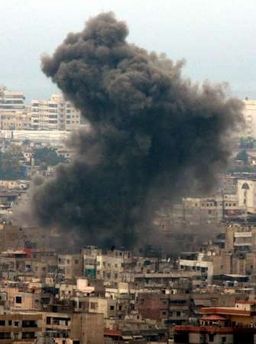 A cloud of smoke rises from a neighbourhood in Hizbollah’s stronghold of a southern suburb in Beirut after an Israeli air strike July 15, 2006. Israeli aircraft pounded areas in south, east and northern Lebanon on Saturday, a day after Hizbollah’s chief declared an open war against the Jewish state following the bombardment of his stronghold in Beirut. REUTERS/Adnan Hajj. (LEBANON)
A cloud of smoke rises from a neighbourhood in Hizbollah’s stronghold of a southern suburb in Beirut after an Israeli air strike July 15, 2006. Israeli aircraft pounded areas in south, east and northern Lebanon on Saturday, a day after Hizbollah’s chief declared an open war against the Jewish state following the bombardment of his stronghold in Beirut. REUTERS/Adnan Hajj. (LEBANON)
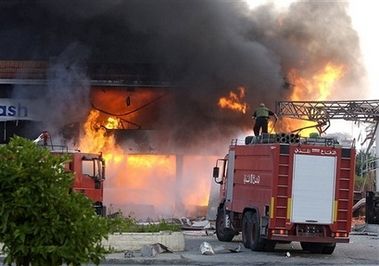 A Lebanese soldier extinguishes a fire from burned cars in Tyre after it was hit by Israeli air strikes in south Lebanon July 15,2006. Israeli aircraft pounded areas in south, east and northern Lebanon on Saturday, a day after Hizbollah’s chief declared an open war against the Jewish state following the bombardment of his stronghold in Beirut. REUTERS/Haidar Hawila (LEBANON)
A Lebanese soldier extinguishes a fire from burned cars in Tyre after it was hit by Israeli air strikes in south Lebanon July 15,2006. Israeli aircraft pounded areas in south, east and northern Lebanon on Saturday, a day after Hizbollah’s chief declared an open war against the Jewish state following the bombardment of his stronghold in Beirut. REUTERS/Haidar Hawila (LEBANON)
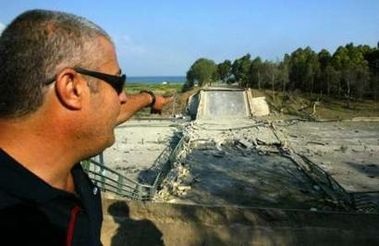 A man points to a bridge in Damour that was hit by Israeli airstrikes in south Lebanon July 15, 2006. Israeli aircraft pounded areas in south, east and northern Lebanon on Saturday, a day after Hizbollah’s chief declared an open war against the Jewish state following the bombardment of his stronghold in Beirut. REUTERS/Sharif Karim (LEBANON)
A man points to a bridge in Damour that was hit by Israeli airstrikes in south Lebanon July 15, 2006. Israeli aircraft pounded areas in south, east and northern Lebanon on Saturday, a day after Hizbollah’s chief declared an open war against the Jewish state following the bombardment of his stronghold in Beirut. REUTERS/Sharif Karim (LEBANON)
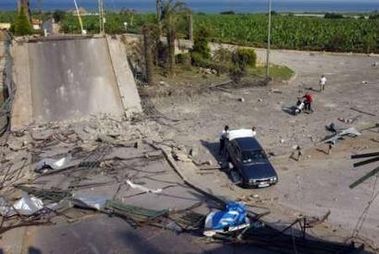 Naemeh bridge is seen after being hit by Israeli air strikes in south Lebanon July 15, 2006. Israeli aircraft pounded areas in south, east and northern Lebanon on Saturday, a day after Hizbollah’s chief declared an open war against the Jewish state following the bombardment of his stronghold in Beirut. REUTERS/Sharif Karim (LEBANON)
Naemeh bridge is seen after being hit by Israeli air strikes in south Lebanon July 15, 2006. Israeli aircraft pounded areas in south, east and northern Lebanon on Saturday, a day after Hizbollah’s chief declared an open war against the Jewish state following the bombardment of his stronghold in Beirut. REUTERS/Sharif Karim (LEBANON)
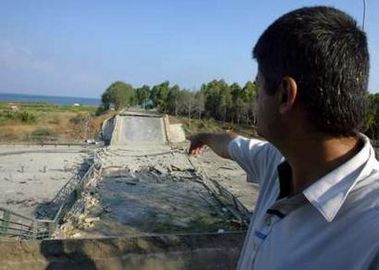 A man points to a bridge that was hit by Israeli air strikes in Damour, south Lebanon, July 15, 2006. Israeli aircraft pounded areas in south, east and northern Lebanon on Saturday, a day after Hizbollah’s chief declared an open war against the Jewish state following the bombardment of his stronghold in Beirut. REUTERS/Sharif Karim (LEBANON)
A man points to a bridge that was hit by Israeli air strikes in Damour, south Lebanon, July 15, 2006. Israeli aircraft pounded areas in south, east and northern Lebanon on Saturday, a day after Hizbollah’s chief declared an open war against the Jewish state following the bombardment of his stronghold in Beirut. REUTERS/Sharif Karim (LEBANON)
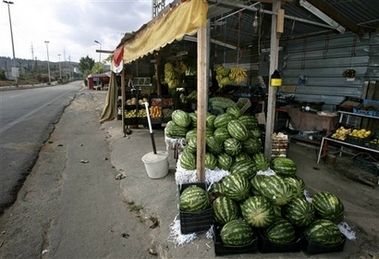 Roadside grocery and fruit stalls stand deserted after the owners fled as a missile, fired from Israeli warplane, struck nearby, in the southern village of Adousiyeh, south Lebanon, Saturday July 15, 2006. Israeli warplanes renewed attacks on Lebanon early Saturday, targeting bridges, fuel storage tanks and gas stations in the east and south, security officials said. (AP Photo/Lefteris Pitarakis)
Roadside grocery and fruit stalls stand deserted after the owners fled as a missile, fired from Israeli warplane, struck nearby, in the southern village of Adousiyeh, south Lebanon, Saturday July 15, 2006. Israeli warplanes renewed attacks on Lebanon early Saturday, targeting bridges, fuel storage tanks and gas stations in the east and south, security officials said. (AP Photo/Lefteris Pitarakis)
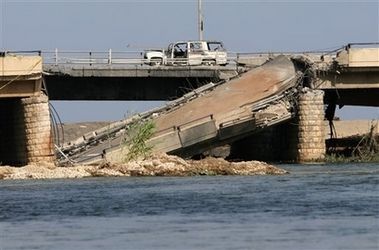 A damaged car is seen abandoned at a destroyed bridge after it was struck by an Israeli warplane missile on the outskirts of the southern Lebanon city of Tyre, Saturday July 15, 2006. Israel has bombarded Lebanon‘s airport and main roads in the most intensive offensive against the country in 24 years, while Hezbollah has fired an almost nonstop barrage of rockets at northern Israeli towns and cities. (AP Photo/Nasser Nasser)
A damaged car is seen abandoned at a destroyed bridge after it was struck by an Israeli warplane missile on the outskirts of the southern Lebanon city of Tyre, Saturday July 15, 2006. Israel has bombarded Lebanon‘s airport and main roads in the most intensive offensive against the country in 24 years, while Hezbollah has fired an almost nonstop barrage of rockets at northern Israeli towns and cities. (AP Photo/Nasser Nasser)
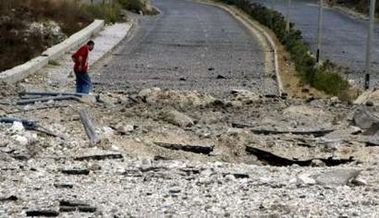 Lebanese civilians inspect a bridge in Nabatiyeh that was hit by Israeli air strikes in south Lebanon July 15,2006. Israeli aircraft pounded areas in south, east and northern Lebanon on Saturday, a day after Hizbollah’s chief declared an open war against the Jewish state following the bombardment of his stronghold in Beirut. REUTERS/Kamil Jaber (LEBANON)
Lebanese civilians inspect a bridge in Nabatiyeh that was hit by Israeli air strikes in south Lebanon July 15,2006. Israeli aircraft pounded areas in south, east and northern Lebanon on Saturday, a day after Hizbollah’s chief declared an open war against the Jewish state following the bombardment of his stronghold in Beirut. REUTERS/Kamil Jaber (LEBANON)
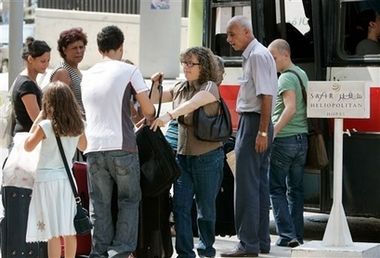 Foreign citizens of mixed nationalities board a bus evacuating people to Damascus, Syria, outside a hotel in Beirut, Lebanon Saturday, July 15, 2006 as Israeli warplanes pounded Hezbollah’s south Beirut stronghold and roads around the country, killing at least 16 Lebanese as they fled the onslaught. (AP Photo/Ben Curtis)
Foreign citizens of mixed nationalities board a bus evacuating people to Damascus, Syria, outside a hotel in Beirut, Lebanon Saturday, July 15, 2006 as Israeli warplanes pounded Hezbollah’s south Beirut stronghold and roads around the country, killing at least 16 Lebanese as they fled the onslaught. (AP Photo/Ben Curtis)
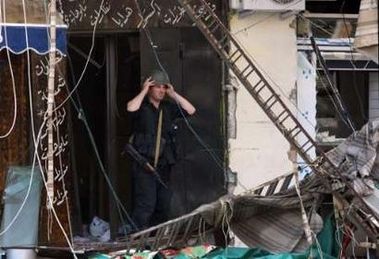 A member of the Hizbollah group guards buildings in southern Beirut July 15, 2006, the Hizbollah stronghold that was attacked Friday by Israeli warplanes. Israeli aircraft pounded areas in south, east and northern Lebanon on Saturday, a day after Hizbollah’s chief declared an open war against the Jewish state following the bombardment of his stronghold in Beirut. REUTERS/Adnan Hajj (LEBANON)
A member of the Hizbollah group guards buildings in southern Beirut July 15, 2006, the Hizbollah stronghold that was attacked Friday by Israeli warplanes. Israeli aircraft pounded areas in south, east and northern Lebanon on Saturday, a day after Hizbollah’s chief declared an open war against the Jewish state following the bombardment of his stronghold in Beirut. REUTERS/Adnan Hajj (LEBANON)
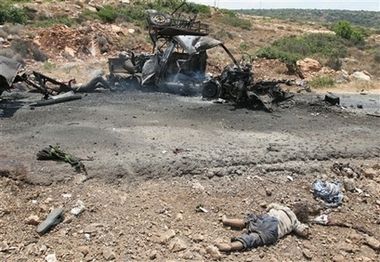 Bodies of civilian villagers are seen in and around the wreckage of their vehicles on the main road near the southern border village of Ter Harfa, Lebanon, Saturday, July 15, 2006. At least 12 Lebanese villagers, including women and children, were killed in what appeared to be an Israeli airstrike on a convoy of vehicles evacuating a village near the border with Israel in southern Lebanon, a witness said. The convoy was leaving the village of Marwaheen, which abuts the border, when it was attacked. (AP Photo/Nasser Nasser)
Bodies of civilian villagers are seen in and around the wreckage of their vehicles on the main road near the southern border village of Ter Harfa, Lebanon, Saturday, July 15, 2006. At least 12 Lebanese villagers, including women and children, were killed in what appeared to be an Israeli airstrike on a convoy of vehicles evacuating a village near the border with Israel in southern Lebanon, a witness said. The convoy was leaving the village of Marwaheen, which abuts the border, when it was attacked. (AP Photo/Nasser Nasser) 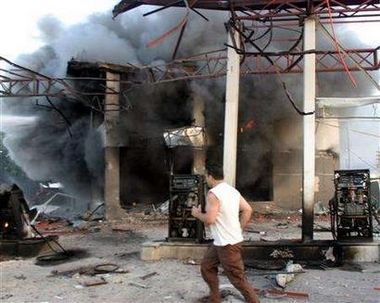 A Lebanese man escapes from a gasoline station after it was hit by an Israeli air strike in Saida, south Lebanon, July 15, 2006. Israeli aircraft pounded areas in south, east and northern Lebanon on Saturday, a day after Hizbollah’s chief declared an open war against the Jewish state following the bombardment of his stronghold in Beirut. REUTERS/Ali Hashisho
A Lebanese man escapes from a gasoline station after it was hit by an Israeli air strike in Saida, south Lebanon, July 15, 2006. Israeli aircraft pounded areas in south, east and northern Lebanon on Saturday, a day after Hizbollah’s chief declared an open war against the Jewish state following the bombardment of his stronghold in Beirut. REUTERS/Ali Hashisho
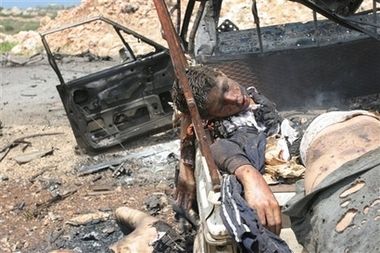 Bodies of civilian villagers are seen next to the wreckage of their vehicles on the main road near the southern border village of Ter Harfa, Lebanon Saturday July 15, 2006. At least 12 Lebanese villagers, including women and children, were killed in what appeared to be an Israeli airstrike on a convoy of vehicles evacuating a village near the border with Israel in southern Lebanon, a witness said. The convoy was leaving the village of Marwaheen, which abuts the border, when it was attacked. (AP Photo/Nasser Nasser)
Bodies of civilian villagers are seen next to the wreckage of their vehicles on the main road near the southern border village of Ter Harfa, Lebanon Saturday July 15, 2006. At least 12 Lebanese villagers, including women and children, were killed in what appeared to be an Israeli airstrike on a convoy of vehicles evacuating a village near the border with Israel in southern Lebanon, a witness said. The convoy was leaving the village of Marwaheen, which abuts the border, when it was attacked. (AP Photo/Nasser Nasser)
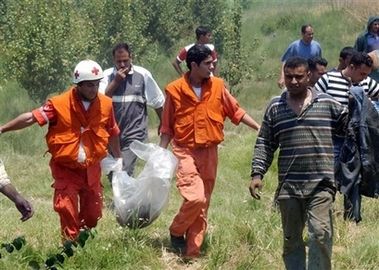 Lebanese Red Cross rescuers carry a bag containing remains of civilians who were killed in an Israeli airstrike on a bridge in Taanayel, on the Beirut-Damascus highway, in the Bekaa Valley, eastern Lebanon, Saturday, July 15, 2006. Israeli warplanes pounded Hezbollah’s south Beirut stronghold and roads around the country, killing at least 15 Lebanese as they fled the onslaught. Hezbollah expanded its rocket fire, hitting another of Israel ‘s main cities, and Israel warned that the guerrillas could strike Tel Aviv. (AP Photo/Samer Husseini)
Lebanese Red Cross rescuers carry a bag containing remains of civilians who were killed in an Israeli airstrike on a bridge in Taanayel, on the Beirut-Damascus highway, in the Bekaa Valley, eastern Lebanon, Saturday, July 15, 2006. Israeli warplanes pounded Hezbollah’s south Beirut stronghold and roads around the country, killing at least 15 Lebanese as they fled the onslaught. Hezbollah expanded its rocket fire, hitting another of Israel ‘s main cities, and Israel warned that the guerrillas could strike Tel Aviv. (AP Photo/Samer Husseini)
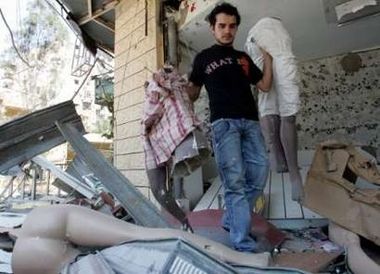 A Lebanese man inspects his shop in southern Beirut July 15, 2006, the Hizbollah stronghold that was attacked Friday by Israeli warplanes. Israeli aircraft pounded areas in south, east and northern Lebanon on Saturday, a day after Hizbollah’s chief declared an open war against the Jewish state following the bombardment of his stronghold in Beirut. REUTERS/Adnan Hajj.(LEBANON)
A Lebanese man inspects his shop in southern Beirut July 15, 2006, the Hizbollah stronghold that was attacked Friday by Israeli warplanes. Israeli aircraft pounded areas in south, east and northern Lebanon on Saturday, a day after Hizbollah’s chief declared an open war against the Jewish state following the bombardment of his stronghold in Beirut. REUTERS/Adnan Hajj.(LEBANON) 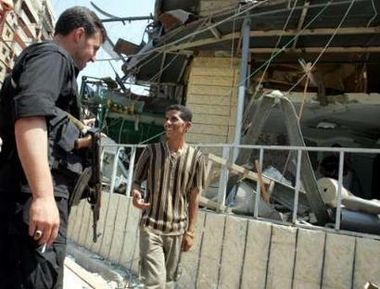 A member of the Hizbollah group guards buildings in southern Beirut July 15, 2006, the Hizbollah stronghold that was attacked Friday by Israeli warplanes. Israeli aircraft pounded areas in south, east and northern Lebanon on Saturday, a day after Hizbollah’s chief declared an open war against the Jewish state following the bombardment of his stronghold in Beirut. REUTERS/Adnan Hajj.(LEBANON)
A member of the Hizbollah group guards buildings in southern Beirut July 15, 2006, the Hizbollah stronghold that was attacked Friday by Israeli warplanes. Israeli aircraft pounded areas in south, east and northern Lebanon on Saturday, a day after Hizbollah’s chief declared an open war against the Jewish state following the bombardment of his stronghold in Beirut. REUTERS/Adnan Hajj.(LEBANON)
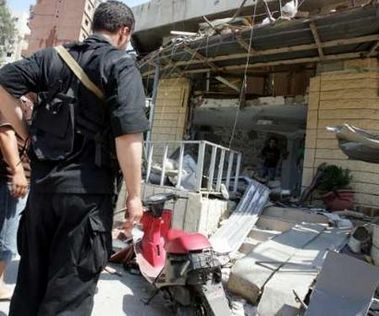 A member of the Hizbollah group guards buildings in southern Beirut July 15, 2006, the Hizbollah stronghold that was attacked Friday by Israeli warplanes. Israeli aircraft pounded areas in south, east and northern Lebanon on Saturday, a day after Hizbollah’s chief declared an open war against the Jewish state following the bombardment of his stronghold in Beirut. REUTERS/Adnan Hajj.(LEBANON)
A member of the Hizbollah group guards buildings in southern Beirut July 15, 2006, the Hizbollah stronghold that was attacked Friday by Israeli warplanes. Israeli aircraft pounded areas in south, east and northern Lebanon on Saturday, a day after Hizbollah’s chief declared an open war against the Jewish state following the bombardment of his stronghold in Beirut. REUTERS/Adnan Hajj.(LEBANON) 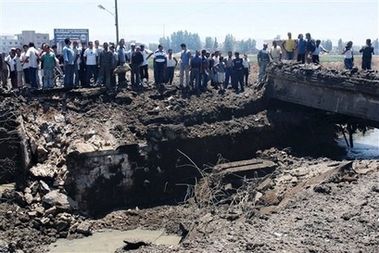 Lebanese civilians gather next to a bridge that was destroyed during an Israeli airstrikes in Taanayel, on the Beirut-Damascus highway, in the Bekaa Valley, eastern Lebanon, Saturday, July 15, 2006. Israeli warplanes pounded Hezbollah’s south Beirut stronghold and roads around the country, killing at least 15 Lebanese as they fled the onslaught. Hezbollah expanded its rocket fire, hitting another of Israel’s main cities, and Israel warned that the guerrillas could strike Tel Aviv. (AP Photo/Samer Husseini)
Lebanese civilians gather next to a bridge that was destroyed during an Israeli airstrikes in Taanayel, on the Beirut-Damascus highway, in the Bekaa Valley, eastern Lebanon, Saturday, July 15, 2006. Israeli warplanes pounded Hezbollah’s south Beirut stronghold and roads around the country, killing at least 15 Lebanese as they fled the onslaught. Hezbollah expanded its rocket fire, hitting another of Israel’s main cities, and Israel warned that the guerrillas could strike Tel Aviv. (AP Photo/Samer Husseini)
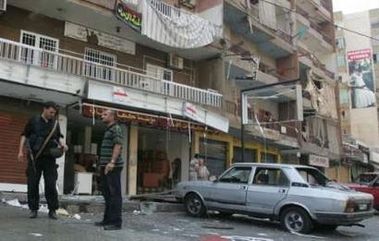 Members of the Hizbollah group guard buildings in southern Beirut July 15, 2006, the Hizbollah stronghold that was attacked on Friday by Israeli warplanes. Israeli aircraft pounded areas in south, east and northern Lebanon on Saturday, a day after Hizbollah’s chief declared an open war against the Jewish state following the bombardment of his stronghold in Beirut. REUTERS/Adnan Hajj (LEBANON)
Members of the Hizbollah group guard buildings in southern Beirut July 15, 2006, the Hizbollah stronghold that was attacked on Friday by Israeli warplanes. Israeli aircraft pounded areas in south, east and northern Lebanon on Saturday, a day after Hizbollah’s chief declared an open war against the Jewish state following the bombardment of his stronghold in Beirut. REUTERS/Adnan Hajj (LEBANON) 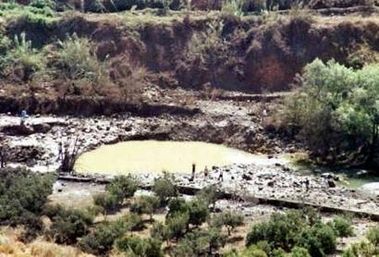 Lebanese civilians look at a hole in Akar that was hit by Israeli air strikes in north Lebanon July 15,2006. Israeli aircraft pounded areas in south, east and northern Lebanon on Saturday, a day after Hizbollah’s chief declared an open war against the Jewish state following the bombardment of his stronghold in Beirut. QUALITY FROM SOURCE REUTERS/Omar Ibrahim (LEBANON)
Lebanese civilians look at a hole in Akar that was hit by Israeli air strikes in north Lebanon July 15,2006. Israeli aircraft pounded areas in south, east and northern Lebanon on Saturday, a day after Hizbollah’s chief declared an open war against the Jewish state following the bombardment of his stronghold in Beirut. QUALITY FROM SOURCE REUTERS/Omar Ibrahim (LEBANON)
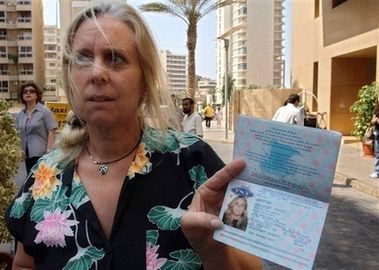 Julianne Janice, 51, from California, U.S.A, who works and has a permanent residency in Saudi Arabia, shows her U.S. passport, in front of a hotel in Beirut, Lebanon, Saturday, July 15, 2006, where Saudi tourists were waiting to be evacuated after Israeli forces raided Lebanon. Israeli warplanes pounded Hezbollah’s south Beirut stronghold and roads around the country, killing at least 15 Lebanese as they fled the onslaught. Hezbollah expanded its rocket fire, hitting another of Israel ‘s main cities, and Israel warned that the guerrillas could strike Tel Aviv. (AP Photo/Mahmoud Tawil)
Julianne Janice, 51, from California, U.S.A, who works and has a permanent residency in Saudi Arabia, shows her U.S. passport, in front of a hotel in Beirut, Lebanon, Saturday, July 15, 2006, where Saudi tourists were waiting to be evacuated after Israeli forces raided Lebanon. Israeli warplanes pounded Hezbollah’s south Beirut stronghold and roads around the country, killing at least 15 Lebanese as they fled the onslaught. Hezbollah expanded its rocket fire, hitting another of Israel ‘s main cities, and Israel warned that the guerrillas could strike Tel Aviv. (AP Photo/Mahmoud Tawil)
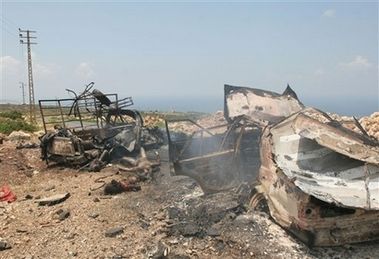 Bodies of civilian villagers are seen next to the wreckage of their vehicles on the main road near the southern border village of Ter Harfa , Lebanon , Saturday July 15, 2006. At least 12 Lebanese villagers, including women and children, were killed in what appeared to be an Israeli airstrike on a convoy of vehicles evacuating a village near the border with Israel in southern Lebanon, a witness said. The convoy was leaving the village of Marwaheen, which abuts the border, when it was attacked. (AP Photo/Nasser Nasser)
Bodies of civilian villagers are seen next to the wreckage of their vehicles on the main road near the southern border village of Ter Harfa , Lebanon , Saturday July 15, 2006. At least 12 Lebanese villagers, including women and children, were killed in what appeared to be an Israeli airstrike on a convoy of vehicles evacuating a village near the border with Israel in southern Lebanon, a witness said. The convoy was leaving the village of Marwaheen, which abuts the border, when it was attacked. (AP Photo/Nasser Nasser)
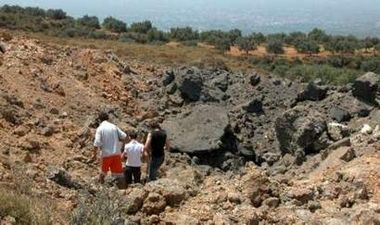 Lebanese civilians look at a hole in Zgharta that was hit by Israeli air strikes in north Lebanon July 15,2006. Israeli aircraft pounded areas in south, east and northern Lebanon on Saturday, a day after Hizbollah’s chief declared an open war against the Jewish state following the bombardment of his stronghold in Beirut. REUTERS/Kamil Jaber.(LEBANON)
Lebanese civilians look at a hole in Zgharta that was hit by Israeli air strikes in north Lebanon July 15,2006. Israeli aircraft pounded areas in south, east and northern Lebanon on Saturday, a day after Hizbollah’s chief declared an open war against the Jewish state following the bombardment of his stronghold in Beirut. REUTERS/Kamil Jaber.(LEBANON)
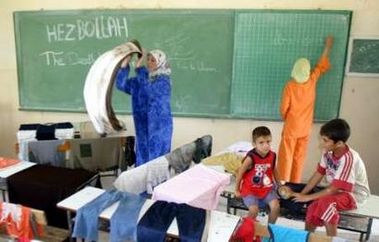 A Lebanese family fleeing the Israeli attacks on south Lebanon rest in a school in Beirut July 15,2006. Israeli aircraft pounded areas in south, east and northern Lebanon on Saturday, a day after Hizbollah’s chief declared an open war against the Jewish state following the bombardment of his stronghold in Beirut. REUTERS/Ali Hashisho. (LEBANON)
A Lebanese family fleeing the Israeli attacks on south Lebanon rest in a school in Beirut July 15,2006. Israeli aircraft pounded areas in south, east and northern Lebanon on Saturday, a day after Hizbollah’s chief declared an open war against the Jewish state following the bombardment of his stronghold in Beirut. REUTERS/Ali Hashisho. (LEBANON)
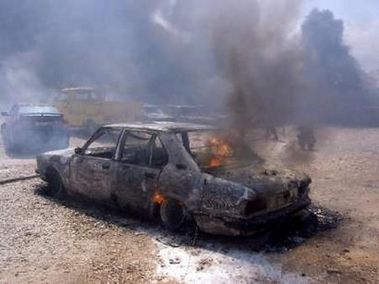 Smoke and fire rises from a burned car in Tyre after it was hit by Israeli air strikes in south Lebanon July 15,2006. Israeli aircraft pounded areas in south, east and northern Lebanon on Saturday, a day after Hizbollah’s chief declared an open war against the Jewish state following the bombardment of his stronghold in Beirut. REUTERS/Haidar Hawila. (LEBANON)
Smoke and fire rises from a burned car in Tyre after it was hit by Israeli air strikes in south Lebanon July 15,2006. Israeli aircraft pounded areas in south, east and northern Lebanon on Saturday, a day after Hizbollah’s chief declared an open war against the Jewish state following the bombardment of his stronghold in Beirut. REUTERS/Haidar Hawila. (LEBANON)
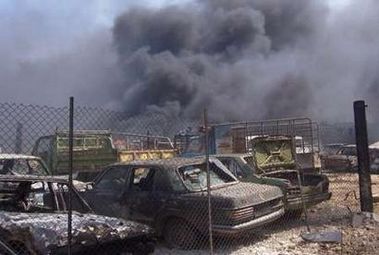 Smoke rises from burned cars in Tyre after they were hit by Israeli air strikes in south Lebanon July 15,2006. Israeli aircraft pounded areas in south, east and northern Lebanon on Saturday, a day after Hizbollah’s chief declared an open war against the Jewish state following the bombardment of his stronghold in Beirut. REUTERS/Haidar Hawila. (LEBANON)
Smoke rises from burned cars in Tyre after they were hit by Israeli air strikes in south Lebanon July 15,2006. Israeli aircraft pounded areas in south, east and northern Lebanon on Saturday, a day after Hizbollah’s chief declared an open war against the Jewish state following the bombardment of his stronghold in Beirut. REUTERS/Haidar Hawila. (LEBANON)
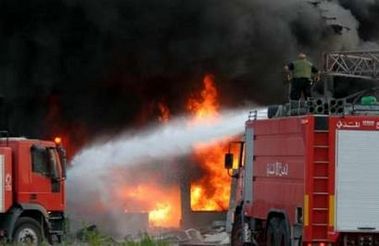 A Lebanese fireman douses fire at a gasoline station after it was hit by Israeli air strikes in Saida, south Lebanon, July 15, 2006. Israeli air strikes killed at least 27 civilians on Saturday, pounding Lebanon for a fourth straight day to punish it for letting Syrian- and Iranian-backed Hizbollah fighters threaten northern Israel . REUTERS/Ali Hashisho (LEBANON)
A Lebanese fireman douses fire at a gasoline station after it was hit by Israeli air strikes in Saida, south Lebanon, July 15, 2006. Israeli air strikes killed at least 27 civilians on Saturday, pounding Lebanon for a fourth straight day to punish it for letting Syrian- and Iranian-backed Hizbollah fighters threaten northern Israel . REUTERS/Ali Hashisho (LEBANON) 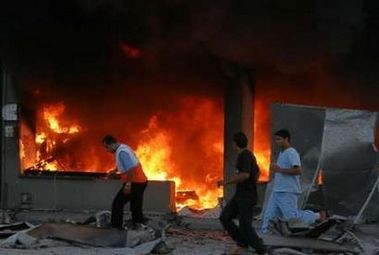 Lebanese civilians and a medic escape from a gasoline station after it was hit by Israeli air strikes in Saida, south Lebanon, July 15, 2006. Israeli air strikes killed at least 27 civilians on Saturday, pounding Lebanon for a fourth straight day to punish it for letting Syrian- and Iranian-backed Hizbollah fighters threaten northern Israel . REUTERS/Ali Hashisho (LEBANON)
Lebanese civilians and a medic escape from a gasoline station after it was hit by Israeli air strikes in Saida, south Lebanon, July 15, 2006. Israeli air strikes killed at least 27 civilians on Saturday, pounding Lebanon for a fourth straight day to punish it for letting Syrian- and Iranian-backed Hizbollah fighters threaten northern Israel . REUTERS/Ali Hashisho (LEBANON)
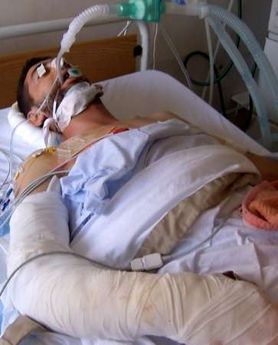 A Lebanese man who was injured by Israeli attacks on Tyre, south Lebanon, lies in a hospital July 15, 2006. Israeli air strikes killed at least 27 civilians on Saturday, pounding Lebanon for a fourth straight day to punish it for letting Syrian- and Iranian-backed Hizbollah fighters threaten northern Israel . REUTERS/Haidar Hawila (Lebanon)
A Lebanese man who was injured by Israeli attacks on Tyre, south Lebanon, lies in a hospital July 15, 2006. Israeli air strikes killed at least 27 civilians on Saturday, pounding Lebanon for a fourth straight day to punish it for letting Syrian- and Iranian-backed Hizbollah fighters threaten northern Israel . REUTERS/Haidar Hawila (Lebanon)
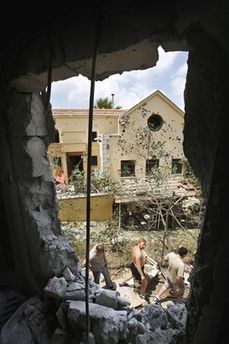 Israelis look at a damaged house that was hit by a rocket fired by Hezbollah guerrillas from neighboring Lebanon in the northern Israeli town of Carmiel Saturday, July 15, 2006. Israeli warplanes pounded Hezbollah’s south Beirut stronghold and roads around the country, killing at least 15 Lebanese as they fled the onslaught. Hezbollah expanded its rocket fire, hitting another of Israel ‘s main cities, and Israel warned that the guerrillas could strike Tel Aviv.(AP Photo/Oded Balilty)
Israelis look at a damaged house that was hit by a rocket fired by Hezbollah guerrillas from neighboring Lebanon in the northern Israeli town of Carmiel Saturday, July 15, 2006. Israeli warplanes pounded Hezbollah’s south Beirut stronghold and roads around the country, killing at least 15 Lebanese as they fled the onslaught. Hezbollah expanded its rocket fire, hitting another of Israel ‘s main cities, and Israel warned that the guerrillas could strike Tel Aviv.(AP Photo/Oded Balilty) 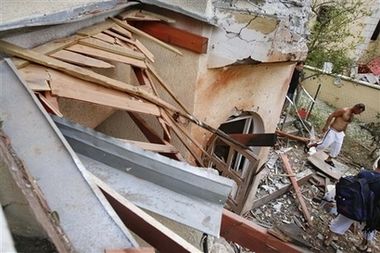 Israelis look at a damaged house that was hit by a rocket fired by Hezbollah guerrillas from neighboring Lebanon in the northern Israeli town of Carmiel Saturday, July 15, 2006. Israeli warplanes pounded Hezbollah’s south Beirut stronghold and roads around the country, killing at least 15 Lebanese as they fled the onslaught. Hezbollah expanded its rocket fire, hitting another of Israel’s main cities, and Israel warned that the guerrillas could strike Tel Aviv.(AP Photo/Oded Balilty)
Israelis look at a damaged house that was hit by a rocket fired by Hezbollah guerrillas from neighboring Lebanon in the northern Israeli town of Carmiel Saturday, July 15, 2006. Israeli warplanes pounded Hezbollah’s south Beirut stronghold and roads around the country, killing at least 15 Lebanese as they fled the onslaught. Hezbollah expanded its rocket fire, hitting another of Israel’s main cities, and Israel warned that the guerrillas could strike Tel Aviv.(AP Photo/Oded Balilty)
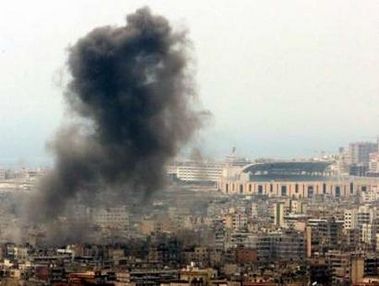 A cloud of smoke rises from the Hizbollah stronghold of a neighbourhood in Beirut’s southern suburb after an Israeli air strike in Beirut Jly 15,2006. Israeli aircraft pounded areas in south, east and northern Lebanon on Saturday, a day after Hizbollah’s chief declared an open war against the Jewish state following the bombardment of his stronghold in Beirut. REUTERS/Adnan Hajj. (LEBANON)
A cloud of smoke rises from the Hizbollah stronghold of a neighbourhood in Beirut’s southern suburb after an Israeli air strike in Beirut Jly 15,2006. Israeli aircraft pounded areas in south, east and northern Lebanon on Saturday, a day after Hizbollah’s chief declared an open war against the Jewish state following the bombardment of his stronghold in Beirut. REUTERS/Adnan Hajj. (LEBANON)
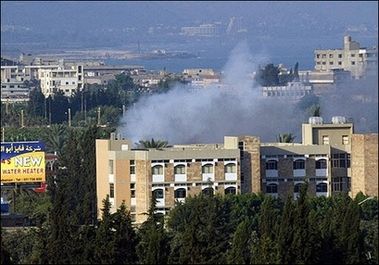 Smoke billows from a building after an Israeli air strike on Saida, southern Lebanon. Israel has kept up its blistering offensive against Lebanon after Hezbollah guerrilla leader Hassan Nasrallah defiantly declared open war in a conflict that appears to be spiralling dangerously out of control despite international calls for restraint.(AFP/Mahmoud Zayat)
Smoke billows from a building after an Israeli air strike on Saida, southern Lebanon. Israel has kept up its blistering offensive against Lebanon after Hezbollah guerrilla leader Hassan Nasrallah defiantly declared open war in a conflict that appears to be spiralling dangerously out of control despite international calls for restraint.(AFP/Mahmoud Zayat)
Israeli army chief Dan Halutz said on Friday more targets would be bombed in a bid to remove Hizbollah from the border and replace it with a force answering to the Lebanese government. He said Israel was also telling the Lebanese that "they swallowed a cancer that has to be regurgitated, and if not this country will pay a price as in the past" — an allusion to Israel’s 1982 invasion to drive out Palestinian guerrillas.
The Israeli army said on Saturday it had struck about 150 targets in Lebanon so far, fewer than a dozen of them linked directly to Hizbollah. Most have hit civilian installations. Israel was bombarding roads in the north and east to try to seal Lebanon’s land border with Syria. It has already bombed Beirut’s international airport and blockaded Lebanese ports. Hizbollah fired more than two dozen rockets at towns in northern Israel, slightly wounding several people.
SAILOR’S BODY FOUND
Hizbollah leader Sayyed Hassan Nasrallah, speaking shortly after Israeli jets destroyed his Beirut home, announced on Friday that his fighters had hit an Israeli warship off Beirut. Several Hizbollah rockets hit the Israeli town of Tiberias on Saturday, the furthest they have landed so far. No casualties were reported in the town, 35 km (22 miles) from the border. The Israeli military has recovered the body of one of four sailors reported missing after the warship was hit.
Israeli military commander Brigadier-General Ido Nehushtan said the body was found at sea and that the military was searching for the other missing sailors. He said Hizbollah had launched an Iranian-made missile at the vessel. The worst violence in Lebanon in a decade coincided with an Israeli attack on the Gaza Strip begun last month to try to get back another captured soldier, halt Palestinian rocket fire and destroy the institutions of the Hamas-led government. Israeli aircraft attacked the Palestinian Economy Ministry and a house in Gaza on Saturday. One Hamas militant was killed in the strike on the house and eight people were wounded.
Since the Gaza offensive was launched on June 28, Israel has killed about 85 Palestinians, around half of them militants. Syria’s ruling Baath Party said it would support Hizbollah and Lebanon against the "barbaric Israeli aggression". The pledge came despite the sometimes hostile ties prevailing between Damascus and Beirut since Syria ended its 29-year military presence in Lebanon last year.
The Beirut government, led by an anti-Syrian coalition, is unable or unwilling to disarm Hizbollah, the only Lebanese faction to keep its guns after the 1975-90 civil war. After Israeli troops quit Lebanon in 2000, Hizbollah confined its attacks largely to the disputed Shebaa Farms area, but its bold assault on Wednesday shattered the tacit rules that had kept the lid on border violence with Israel for six years. The blistering Israeli response is the fiercest since a 17-day blitz on Hizbollah strongholds in the south in 1996.
